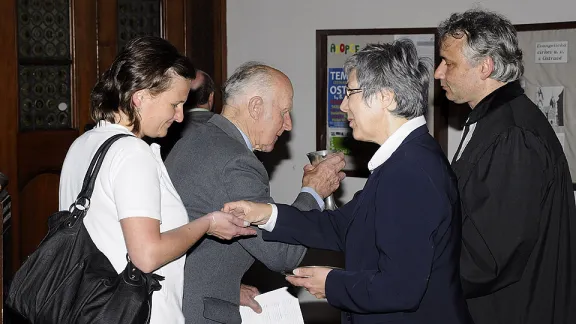
Eucharistic worship during the 2012 LWF European Church Leadership Consultation in Ostrava, Czech Republic © SCEAV/Libor Šikula
European Church Leaders Meet in Ostrava, Czech Republic
Churches must be global citizens addressing issues that can only be tackled at the worldwide level, Rev. Martin Junge, general secretary of The Lutheran World Federation (LWF) told Lutheran leaders from Europe.
In a keynote address to the LWF European Leadership Consultation in Ostrava, Czech Republic, held 11-14 May, Junge noted that the church’s global citizenship is rooted in the call to participate in God’s mission in the world.
“This notion of ‘global citizenship’ calls upon the LWF member churches to express their role in its global dimension, becoming actively involved in the burning global issues that no longer allow for narrow national or regional approaches,” he said at the meeting jointly hosted by the Evangelical Church of Czech Brethren and the Silesian Evangelical Church of the Augsburg Confession.
“Churches,” stressed Junge, “need to address the moral question of why resources are available to rescue a financial system that collapsed because of its ’casino’ addiction, while few resources are found for the unemployed, young families and those with HIV and AIDS.”
“More than ever before, the church is called into the public arena and to advocate for those becoming victims, and those being marginalized in our world,” Junge said.
Expressing Communion in Different Contexts
In his address titled, “On the Way to 2017: The Church in Transformation in Changing Times,” The general secretary elaborated the LWF’s approach to the 500th anniversary of the reformation and outlined three cornerstones; Lutheran reformation as global citizenship; ecumenical sensitivity and accountability; and churches in ongoing reform. He also emphasized the gift of communion among churches in their respective contexts.
Referring to the challenges arising from the fact that churches are rooted in different contexts he underscored: “Let us meet each other with the basic assumption that churches in their diverse theological traditions, piety, and contextual challenges are altogether indeed attempting to faithfully relate to the Scriptures.”
The Chilean theologian underlined relationship building as a core dimension of the Christian faith, saying the gathering of Lutheran leaders presented a prophetic sign. “It powerfully questions the painful consequences of today’s general tendency to withdraw into comfort zones, and to accept hostile fragmentation as an unchangeable reality in our world,” he said.
In their feedback to the keynote address, the different regions emphasized the need to focus on studying Luther’s notion of authority in conjunction with the Reformation anniversary; assessing the role of women in the Reformation; and the possibility of Roman Catholic and Orthodox involvement in the 2017 events. They also deliberated on issues facing larger churches and the challenges of assisting the needy while attempting to build confidence in the church itself as a relevant institution.
In their greetings to the LWF gathering, Silesian Bishop Jan Waclawek and Rev. Joel Ruml, Moderator of the Evangelical Church of Czech Brethren, expressed their delight that this meeting was taking place in the country.
The consultation participants and other worshippers attended a festive Eucharist service at the Christ Church in Ostrava, which is shared by the Silesian and the Czech Brethren congregations. There was daily prayer life at the conference venue, and Sunday parish visits and worship.
Bishop Waclawek described the Christ Church as a strong expression of ‘communio’ in Central Eastern Europe. “Although the two LWF member churches in this country have been shaped by different historical and Lutheran traditions, our unique context has challenged us over the years to share and learn from each other’s strengths and support each other. Each Sunday and for many other events like this one, this church building becomes a living example of that solidarity,” he added. (622 words)
(Written for LWI by Aleš Wrana, Ostrava, Czech Republic.)


